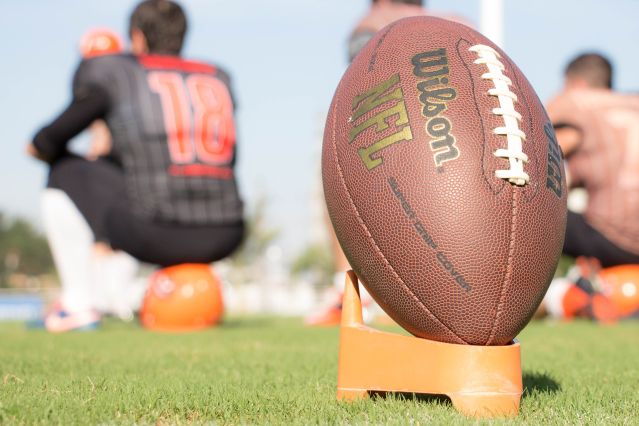Identity
Why Football Fans Get So Emotional
Identifying with our favorite team can be healthy or dysfunctional.
Posted February 10, 2023 Reviewed by Tyler Woods
Key points
- Being part of a fandom provides a sense of community and is related to higher social self-esteem and lower levels of loneliness and alienation.
- Team identification is the degree to which a fan views the team as an extension of self-identity.
- Highly identified fans feel a strong psychological connection to their team, and a feeling of vicarious achievement when their team wins.
- Dysfunctional fans have impaired social functioning, and may engage in behaviors such as confronting others and complaining.

As many people get ready to settle in for Super Bowl Sunday with lots of gameday snacks and team jerseys for everyone from the toddler to the family dog, there’s a shared euphoria on the part of fans of the two teams who have made it this far and a shared excitement among fans of the game in general. For the most passionate football fans, this is a time of anticipation and celebration that has improved people’s moods for the past few weeks, and a reminder of all the things about being a fan that are healthy and positive.
The Fun Side: Highly Identified Fans
We all have a strong need to belong, and being part of a fandom—for a football team, a television show, or a country singer—satisfies belongingness needs and provides a community of like-minded people. Whether watching the game on television with friends and family, cheering together with other fans online, joining the crowd at the corner bar or at the stadium, the sense of community and shared excitement makes the whole experience enjoyable. This is particularly true for individuals who are “highly identified fans,” a concept that has been widely studied in psychological research on sports fans. Team identification is defined as the degree to which the fan views the team as an extension of self-identity; a highly identified fan feels a strong psychological connection to their favorite team. Researcher Daniel Wann and his colleagues have found many benefits to strong team identification, including high social self-esteem and lower levels of loneliness and alienation.
Highly identified fans are also more optimistic about how well their team is going to do in the future, something that is clear in stadium parking lots on game days, even when that home team isn’t going to the Super Bowl. They are also more likely to attend games and buy team-related merchandise—I can testify that the streets of Philadelphia and its inhabitants have been strikingly green for weeks.
According to social identity theory, we all craft our identity within the group(s) to which we belong, so being a fan of a particular team can be central to an individual’s identity. When the team is doing well, fans have a feeling of vicarious achievement, with hormonal surges and other physiological changes similar to those of the athletes on the field. Highly identified fans have even bigger increases in positive emotions following a win. Known as "basking in reflected glory," the team’s successes bring an increase in status and a feeling of pride for highly identified fans, which can be powerfully reinforcing.
The Flip Side: Dysfunctional Fans
While highly identified fans have bigger increases in positive emotions when their team wins, they also experience bigger increases in negative emotions following a loss, including anger, humiliation, and resentment. A team loss can be experienced as a threat to one's social identity, and fans who have a stronger identification with their in-group are more likely to feel angry when this happens. The vast majority of fans will follow social norms and deal with losses without infringing on anyone else’s experience. However, there is a darker side to fandom for a small number of fans, who will diverge from those norms and engage in abusive or aggressive behavior. Researchers have defined these “dysfunctional fans” as having impaired social functioning and engaging in behaviors such as confronting others and complaining. Dysfunctional fans are more likely to behave aggressively at sporting events, shouting insults to rival fans, insulting referees, or even engaging in violent acts.
While humans have always sorted themselves into in-groups and out-groups and policed those boundaries with aggression at times, research suggests that the fans who launch verbal or physical attacks on rival fans do so not just because they are highly identified fans, but because of their individual personality characteristics. Fans who behave aggressively at sporting events or in online spaces may have narcissistic traits and lower levels of self-esteem and thus respond with aggression to any perceived slights or downward revisions of their fragile self-concept that come with a loss.
The more fans identify with a team, the more they also exhibit “status seeking” behavior, a desire for respect and deference from others. Humans are social beings; we want to belong and feel a part of a group, but we also want to be higher on the social ladder so we can have more influence and more “things” that we want. Fans can gain status through the successes of their team, but that status is threatened when their team loses. When these individuals are also highly identified fans, they may pay even more attention to negative outcomes (like losing or being faced with an imminent loss), and thus have stronger reactions to that type of threat to their identity.
Fans manage social identity threats by rallying together to stigmatize, disparage or intimidate rivals. When alcohol at a sporting event is added to the mix, this behavior can be magnified, since alcohol reduces inhibitions that might keep confrontations a little less vocal. Dysfunctional fans, unfortunately, are more likely to view alcohol consumption as an integral part of the sports experience. Research suggests that these sorts of problematic behaviors are not limited to sporting events; someone who is a dysfunctional fan at a football game is likely to show the same sort of behavior in the rest of their life, from ranting in online spaces to confronting food service workers about an imperfect burger to calling complaints in to talk shows.
Enjoying the Game
Luckily, that is a minority of fans.
For most of us, being a fan of our favorite team brings a great deal of joy and excitement. The anticipation is good for us, as is the permission we have to indulge in some much-needed leisure time in the midst of the stresses of everyday life. Yes, it may feel better when our team wins than when they lose, but reminding ourselves that our self-esteem comes from many sources, not just how a football team is doing, can help. Remembering that the sense of belongingness and the community of fans will still be there after the big game ends, to either celebrate together or console each other, can also go a long way toward letting us sit back and enjoy the experience (and maybe spill a little popcorn cheering our team on).
References
Chang, Y. & Wann, D. (2022). Effects of game outcomes and status instability on spectators’ status consumption: The moderating role of implicit team identification. Frontiers in Psychology, 13, 1-14.
Wakefield, K.L. & Wann, D. (2006) An examination of dysfunctional sport fans: Method of classification and relationships with problem behaviors. Journal of Leisure Research, 38, 168-186.


